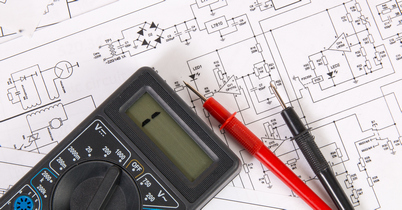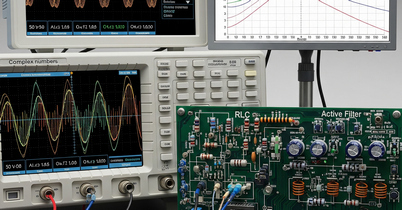Benefits of our courses
Money-back
guarantee
guarantee
If, within 30 days of placing your order, you discover that our courses do not meet your expectations, you will receive a full refund.
Experienced
instructors
instructors
Our instructors are highly experienced professionals and recognized authorities in the technical world.
Course
certificate
certificate
You will receive a course certificate upon completing coursework and finishing the course.
Practical
information
information
Our instructors share their knowledge and experience with you to make your learning process easier.
What you will learn in this course
1
Introduction to this course
Overview of course topics, key electrical principles, and ideal circuit elements. Includes guidance on using the textbook and building habits for active learning.
2
Voltage, current, resistance
Key concepts of voltage, current, and resistance with clear definitions and practical circuit topologies. Covers KCL, real vs. ideal sources, and resistor networks.
3
Power
Fundamentals of power in circuits, sign conventions, and how to achieve maximum power transfer, supported by practical examples.
4
Circuits with sources and resistors
Practical approach to real sources and instruments. Covers Thevenin modeling, use of meters, and connects theory with hands-on examples.
5
Network analysis
Key techniques for analyzing complex networks, including node and mesh methods, superposition, and source transformations, with practical examples to build confidence. Concludes with transformations between Thevenin and Norton equivalents.
6
OpAmps and static circuits
Ideal OpAmp behavior, common circuit topologies (inverting, non-inverting, summing, differential), and important applications such as analog signal conditioning. Real-world limitations, providing a balanced view of OpAmp capabilities.
7
Diodes
Diode behavior and circuit applications. Diode I-V characteristics, rectification, and simple diode-based circuits such as clippers and voltage limiters. Nonlinear device behavior within an otherwise linear circuit framework.
8
Transistors and MOSFETs
Active semiconductor devices: bipolar junction transistors (BJTs) and metal-oxide-semiconductor field-effect transistors (MOSFETs). Device operation, switching behavior, and basic amplifier configurations. Understanding digital logic and analog amplification.
9
Solved problems for voltage, current and resistance lectures
Practice solving circuit problems using KCL, KVL, Thevenin/Norton models, power efficiency, and practical measurement scenarios.
10
Solved problems for opAmps lectures
Work through detailed examples of ideal OpAmp circuits, including multi-input amplifiers, gain calculations, and input resistance.
11
Solved problems for Diodes and transistors lectures
Apply diode and transistor models to practical biasing, regulation, rectification, and switch circuit examples with step-by-step solutions.
12
Simulation labs
Connect theory to simulation by building and analyzing diode and AC circuits in SIMetrix with guided assignments.
13
Hands-on Lab Demos
Bridge theory and practice with real circuits on breadboards, lab tools, and measurements using DMMs, oscilloscopes, and safe wiring techniques.
14
Next steps
Getting ready for the next course on Transient signals and the response of circuits in the time domain.
Pricing Plans
Choose from three different pricing plans that meet your needs and expectations. Begin your learning journey today.
Online
$115
- Ideal for Individuals
- Online video access for 13 weeks for 1 person
- Every online access can be extended for free for 1 month
- All lessons available immediately
- PDF Certificate (after completing activities) for 1 person
- 100% money-back guarantee (up to 30 days from order)
- Unlimited video access (once downloaded)
- Video download available
RECOMMENDED
Online and Download
$232
- Ideal for Individuals and Companies with smaller teams
- Online video access for 13 weeks for up to 3 people
- Every online access can be extended for free for 2 months
- All lessons available immediately
- PDF Certificate (after completing activities) for up to 3 people
- 100% money-back guarantee (up to 30 days from order)
- Unlimited video access (once downloaded)
- Video download available after 30 days
Quick Download
$349
- Ideal for Professionals and Companies with more than 3 engineers
- Online video access for 13 weeks for up to 5 people
- Every online access can be extended for free for 3 months
- All lessons available immediately
- PDF Certificate (after completing activities) for up to 5 people
- 100% money-back guarantee (up to 30 days from order)
- Unlimited video access (once downloaded)
- Video download available immediately
Frequently asked questions about the course
Related Courses

FROM$0
Introduction to electrical engineering
Get a taste of Eric Bogatin’s clear, practical teaching style with this free introductory course, designed to ...

FROM$115
Transient signals and circuits
A practical course on dynamic electrical circuits led by Eric Bogatin. Covers step responses, transient and st...

FROM$115
Sine Wave Signals, circuits and impedance
Practical, in-depth foundation in frequency domain circuit analysis. Starting with phasors and complex numbers...